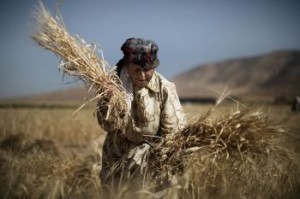 The World Farmers Organisation (WFO) and Global Forum on Agricultural Research (GFAR) co-sponsored a parallel event at the United Nations (UN) Commission on Status of Women (CSW) in New York. “Empowering Rural Women Through Agricultural Innovation” highlighted the farmer panelists’ first-hand experiences from their family farm proving how innovation leads to women farmers success and empowerment. Panelists included: Ms. Rose Akaki, Uganda; Ms. María Adela Nores Bodereau, Argentina; Ms. Mildred Crawford, Jamaica; and Mr. Robert Carlson, WFO President; and Mrs. Susan Carlson, WFO Women’s Committee Chair moderated the panel.
The World Farmers Organisation (WFO) and Global Forum on Agricultural Research (GFAR) co-sponsored a parallel event at the United Nations (UN) Commission on Status of Women (CSW) in New York. “Empowering Rural Women Through Agricultural Innovation” highlighted the farmer panelists’ first-hand experiences from their family farm proving how innovation leads to women farmers success and empowerment. Panelists included: Ms. Rose Akaki, Uganda; Ms. María Adela Nores Bodereau, Argentina; Ms. Mildred Crawford, Jamaica; and Mr. Robert Carlson, WFO President; and Mrs. Susan Carlson, WFO Women’s Committee Chair moderated the panel.
“Globally women farmers work very hard,” said WFO President Robert Carlson. “They are often responsible for the farm, raising the family, running the household and for making off farm income as well. Unfortunately, they are an undervalued human resource.
Many studies show that women are more amenable to change and innovation than men, and women are more driven to improve the future for their children. But, they often lack assets other than their own skills and labor. There are many courageous women who have overcome adversity and created successful farms. They need a chance to share their inspiring stories with others, including the next generation of farmers, through their farm organizations and WFO.”
Rose Akaki, a beef farmer from Uganda shared her story of diversifying her family beef farm as well as encouraging other area neighbors to become beekeepers. They formed the Maruzi Beekeeping Association, which has grown beyond their village to regional membership, processing, packaging, and marketing their “Go Honey”.
Adela Nores, an Argentine rancher, improved her ranch’s profitability despite the economical crisis their country is experiencing. She now uses direct seeding of pastures, planting perennial seeds, seeding winter pasture grasses, implemented rotational grazing practices, weaning calves earlier, utilizing artificial insemination and Red Angus bulls, transitioned from mixed breeds to cross breed cattle resulting in increased pregnancy rates, and she sells cattle throughout the year rather than at one annual sale.
Mildred Crawford, a pig farmer and pig artificial inseminator helped create the Jamaican Pig Farmer Association and the Jamaican Network of Rural Women Producers. She shared case studies of women farmers in Jamaica and the rationale for launching these JPFA and JNRWP.
Both WFO and the Global Forum on Agricultural Research recognize that rural women and their families are the backbone of the agriculture sector. They participate in crop production and livestock care, provide food for their families, and carry out vital functions in caring for children and families.
Responding to the need for rural women’s needs to be more effectively met, the Global Forum has mobilized the Gender in Agriculture Partnership (GAP), an inclusive multi-partner movement for change in the sector. Harry Palmier, Senior Partnerships Officer in the Global Forum’s Secretariat highlighted the essential need for collective action to meet these needs at scale, as seen in the GAP, which now directly links farmer organizations with 150 other agencies, working together to address the equality and economic empowerment of rural women around the world.
In summary, Susan Carlson said, “WFO and our partners in GAP are committed to empowering women farmers and to find ways to lift up all farmers from the many inequities that exist in today’s world. Women farmer’s innovation and entrepreneurship are evidence of their commitment and dedication to their family farm—their way of life and their livelihood.”
Photo credit: ©FAO/Marco Longari

